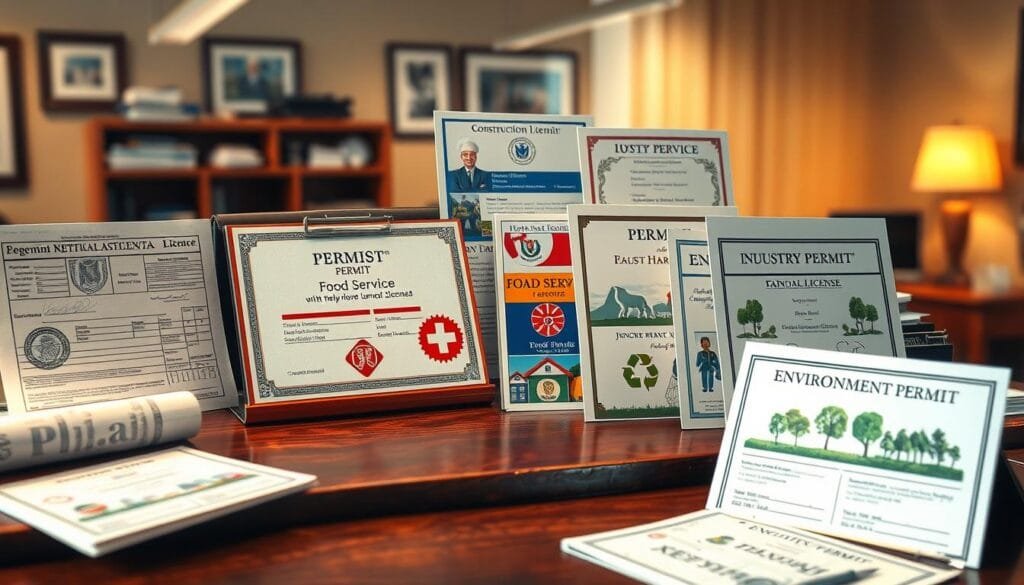Starting your own business means you need to follow some rules. One main rule is to acquire a business license. This document is key for operating legally and shows you’re committed to following the laws for businesses in your area. Not getting this license can cause big problems, like fines or being forced to close.
Key Takeaways
- Acquiring a business license is a fundamental step for any legal business operation.
- Understanding local regulations is critical; Nevada, for instance, has six jurisdictions, each with distinct licensing agencies1.
- State-specific requirements must be met; in Nevada, this includes annual renewal through the Secretary of State and verification for sales permits2.
- Some business entities can benefit from exemptions; sole proprietors in Nevada might not need an EIN if they have no employees1.
- Fees vary by entity type; for example, starting an LLC in Nevada costs $425, compared to at least $725 for incorporating1.
- Special state licenses may be required for specific occupations, like contractors or beauticians, in Nevada2.
- It’s essential for partnerships, corporations, or LLCs in Nevada to obtain an Employer Identification Number2.
Understanding the Importance of a Business License
Getting a business license is key. It shows your business is real and follows local laws. Without one, you could face big fines3.
Being licensed does more than just meet legal rules. It helps keep your business running, builds trust with customers, and opens doors to new opportunities. For example, you might get to compete for government contracts only available to businesses that follow the rules reserving opportunities4.
Benefits of Compliance and Business Licensing: Licensing links directly to advantages for your business. It assures customers and partners of your commitment to legality and ethics4.
| License Type | Required By | Purpose | Penalties for Non-Compliance |
|---|---|---|---|
| General Business License | Local municipalities | Basic operational legality | Fines, operational shutdown |
| Professional Services License | State governments | Verification of professional standards | Suspension of professional practice |
| Health and Safety Permits | County health departments | Ensuring public health standards | Hefty fines, legal actions |
| Federal Licensing | Federal agencies | Operational legality in specialized sectors | Penalties, possible criminal charges |
The different licenses outlined in the table show the scope and safety standards a business follows. Understanding how following local rules affects everything—from starting up to growing your client base—is crucial. It’s the key to long-term success and integrity in your field5.
In summary, getting and keeping a business license is crucial. It keeps you legal, avoids legal issues, and helps your business grow and gain trust345.
How to Get a Business License
Getting a business license shows you’re official and follow the rules. It might seem hard, but knowing what steps to take helps a lot. Breaking down each step makes getting your license easier.
Identify Your Business Activity
The first important step is figuring out what kind of business you have. This affects which license you need and the rules you follow. It’s key to know if you need a general license or something more specific.
Check Local and State Requirements
License needs change based on your business and where it is. Talk to local offices or business groups to learn what you must do. For example, hiring soon or making over $12,000 yearly means getting the right license6.
Prepare Necessary Documentation
Getting your papers together is a big part of the licensing process. This usually means having a business plan, tax info, and lease papers if needed. Good paperwork means a smoother process, whether online or by mail. Online might take 10 days, mail could take six weeks6.
Understanding Fees and Processing Time
Knowing the cost and how long it takes is key to planning. Consider the initial fees and any extra ones. In Delaware, for instance, expect your license in a month and renew every December 317. This helps in budgeting and avoiding delays.

| License Type | Fees | Processing Time |
|---|---|---|
| Standard One-Year | $50 – $200 | 10-30 days |
| Multi-Year (3 years) | $150 – $600 | 10 working days7 |
| Temporary | $20 – $100 | Immediate online7 |
Understanding the process, from your business type to fees and time, makes getting a license easier and less stressful. Being prepared and informed is the best way to navigate this important part of your business.
Common Types of Business Licenses Explained
Starting or running a business means you need to know about licenses. Different licenses are needed for different business activities. The type of license you need mainly depends on what your business does and where it’s located.
Most businesses start with a general business license. This license shows your business meets basic rules from local, state, or federal governments. About 30% of businesses need state licenses too8.
If you’re a doctor, lawyer, or accountant, you’ll need a professional license. To get this, you must finish certain school programs, work for a while, pass exams, and keep your license current by paying fees8.
Some businesses, like those in healthcare, food, and construction, need industry-specific permits aside from general ones. Food businesses, for example, must have health permits. These health permit rules can be quite different in each state9.

The table below shows the types of licenses required for various jobs:
| License Type | Common Professions | Renewal Requirements |
|---|---|---|
| Professional License | Accountants, Nurses, Electricians | Periodic exams, Continued education |
| General Business License | Retail, Services | 1 to 5 years depending on locale8 |
| Industry-specific Permit | Healthcare, Food, Construction | Compliance checks, Regular updates |
Getting the right licenses is crucial for your business to be legal and ethical. It’s smart to plan ahead because getting a license can take time8. Also, knowing when to renew your license is important to keep your business running smoothly8.
Following the rules and getting the right licenses can bring big benefits. It helps protect your business legally, builds trust with customers, and can even help you get funding. Every license, from general to specific, plays an important part in making sure your business meets safety and regulation standards.
Navigating State and Federal Licenses
Understanding the licensing landscape is key for businesses in regulated industries. It’s not just about following the law. It helps a company operate smoothly without the problems that come from not having the right licenses.
Federal Licenses and Industries That Require Them
Highly regulated sectors need to pay close attention to federal licensing. For instance, if a business is overseen by agencies like the FDA, USDA, SEC, and ATF, it needs the right federal licenses10. These requirements cover many areas. They range from grocery wholesalers and trucking services to restaurants with alcohol and gun stores10. Also, if a business deals with a lot of produce, handling more than 2,000 pounds of fruits and vegetables daily, it has to get a PACA license from the USDA10.
How to Apply for State-Specific Business Licenses
The process to get a business license at the state level can be complex. It requires careful planning and research. For example, some states, like Washington and Alaska, need state and local business licenses10.
Moreover, professionals in fields such as medicine, real estate, and cosmetology must get state-specific licenses. These licenses are based on education and tests11.
Renewing Your Licenses: What You Need to Know
Keeping up with license renewal is part of staying compliant. Planning renewals ahead of time helps avoid business disruptions. The consequences of not following the rules are increasing12.
Businesses need to keep up with law changes that affect licenses. Changes in business ownership, location, or introducing new products can affect licensing12.
| Regulation | License Type | Applicable Businesses |
|---|---|---|
| Federal | ATF, FDA | Gun Stores, Food Service |
| State | General Business, Professional | Restaurants, Salons, Real Estate Firms |
| Local | Miscellaneous Permits | Signage, Food Prep, Alarm Systems |
The Role of Local Permits and Zoning Laws
Getting local business permits and following zoning laws is key for entrepreneurs. These rules help businesses operate legally. They affect many parts of running a business.

Local permits are official okay signs from the city that let businesses run legally. Every business needs one, even home-based ones13. Some might also need health and safety permits13.
Zoning laws control how land and buildings can be used. They keep neighborhoods for living or business. Home businesses might have rules on signs, parking, and business space14.
If you don’t follow these rules, you might get fined or closed down. Following them helps keep your business running smoothly without trouble15.
| Permit/Regulation | Implication | Requirement |
|---|---|---|
| Local Business License | Legally operate within the city/county | Mandatory for all businesses13 |
| Zoning Laws | Regulate land and building use | Compliance based on business location and type14 |
| Health and Safety Permits | Ensure safe business operations | Needed depending on business activity13 |
| Home Occupation Permit | Allows business operations in residential areas | Subject to restrictions like noise and traffic14 |
Business owners should talk to zoning boards and Small Business Development Centers. This ensures they understand and follow all rules for their type of business14. This not only helps the business run well but also supports the local economy.
Avoiding Common Mistakes When Applying for Business Licenses
Getting a business license comes with challenges that can lead to extra costs or legal issues16. Understanding these slip-ups can help a company follow the rules and stay in good standing17.
Overlooking Local Compliance Requirements
Many businesses forget about the specific licenses needed for their location. For example, a restaurant might not get the necessary food service license or health inspection certificate16. Likewise, a home-based business may miss getting a zoning approval or a sign permit, which are key for legal operation based on where they are16.
Ignoring Renewal Dates and Late Filing Penalties
Entrepreneurs should renew licenses on time to avoid late fees and penalties16. Not renewing on time can interrupt your business and cause big financial losses due to fines17.
Failing to Update Licenses After Major Business Changes
Major changes, like mergers or a change in business structure, require license updates. Not doing so can bring about non-compliance issues and legal problems16. Keeping information current helps ensure operations run smoothly through any changes16.
| Requirement | Necessity | Consequence of Negligence |
|---|---|---|
| Timely renewal of licenses | Crucial | Late fees, legal issues16 |
| Update after business changes | Essential | Legal repercussions16 |
| Securing location-specific permits | Mandatory | Operational hindrance16 |
Knowing common compliance mistakes, keeping licenses up to date, and remembering renewal times can protect your business. It helps you focus on growing and effectively running your business17.
Benefits of Staying Proactively Licensed
Proactive licensing is key for boosting business credibility and ensuring smooth running. It helps businesses avoid heavy fines and possible stops in operation. This builds strong trust with customers and partners.
With over 150,000 licensing bodies in the U.S., proactive licensing is crucial for navigating rules. This support helps businesses grow sustainably18. The 2018 ruling in South Dakota v. Wayfair shows how online retailers face new tax rules. This highlights the need for active license management18.
Being proactively licensed strengthens licensed entrepreneur advantages in the economy. When businesses keep up with licenses and use the right software, they work more efficiently. This cuts down on risk and sets the stage for growth and better profits18.
| Advantage | Impact |
|---|---|
| Access to business resources | Facilitates competitive bids on government contracts, access to funding opportunities |
| Enhanced business credibility | Builds trust with customers and stakeholders, enhancing brand reputation |
| Licensed entrepreneur advantages | Easier compliance with regulations, minimized legal complications, and enabled market expansion |
Quicker licensing processes bring immediate benefits to communities. They allow businesses to start sooner, boosting the local economy. This leads to more tax money for public services and more jobs19. A smooth licensing process is crucial for fostering business innovation and growth.
The business landscape is always changing, and staying proactively licensed gives businesses an edge. It keeps them ready for new market opportunities. Embracing proactive license management is a smart strategy for long-term success.
Conclusion
Getting a business license is a big part of being a responsible entrepreneur. It shows you’re following the law. The United States makes up 25.4% of the world’s economy and creates over 20% of global income20. Getting this license needs careful attention and following the rules closely.
The cost for a business license goes from $50 to several hundred dollars. It depends on what the business does and where it’s located20. Whether you’re running a small business by yourself or leading a big company, everyone must follow these rules. This ensures that businesses operate legally and stay competitive in the U.S., where there are different rules for LLCs, partnerships, and sole proprietorships21.
To succeed in business, following local and federal laws is key. This includes getting the right permits and licenses for what the business offers22. This doesn’t just keep the business on the right side of the law. It also builds trust with customers and positions the business as a valuable part of the U.S. economy.
FAQ
Why is it essential to acquire a business license?
Getting a business license is vital. It makes your business operations official and follows local rules. Without one, you could pay fines or have to close down.
What are the benefits of having a licensed business?
Having a business license shows that your business is legitimate. It builds trust with customers and might open doors to special opportunities, like government contracts. It also protects your customers and employees by following local laws.
How do I classify my business activity for licensing?
Classify your business based on what you sell or the service you offer. Doing this correctly ensures you get the right license for your business.
What should I know about local and state business licensing requirements?
Business licensing rules can be different in each place. So, it’s important to talk with your local government. This will help you understand exactly what you need to do to get your business licensed correctly.
What documentation do I need when applying for a business license?
You will need to gather documents like a detailed business plan, tax information, and lease agreements. These are needed to apply for a business license based on where your business is located.
How do business license fees and application processing times affect my planning?
Knowing how much the license costs and how long it takes to get it helps you plan your budget and schedule. This way, you can avoid any delays in starting your business operations.
Can you explain the differences between general business licenses, professional licenses, and industry-specific permits?
General business licenses are for a wide range of businesses. Professional licenses are needed for specific jobs like doctors or lawyers. Industry-specific permits are for certain types of businesses, like restaurants or taxis.
What types of businesses require federal licensing?
Businesses in fields like aviation, mining, and telecommunications often need a federal license. This ensures they meet nationwide standards.
How do I apply for state-specific business licenses?
For a state license, follow your state’s steps and gather necessary details like tax numbers. Your state’s business authority can help you with this.
What do I need to know about renewing my business licenses?
Keep track of when your licenses expire and start the renewal process early. This helps you stay legal without any breaks.
How do local permits and zoning laws affect my business license?
You need local permits and to follow zoning laws to meet city rules. These are often required along with a business license.
What are common local compliance requirements that are often overlooked?
Businesses sometimes forget about the need for health department permits, zoning rules, and city-specific laws. Ignoring these can lead to big legal problems.
Why is it important to avoid missing renewal dates for business licenses?
If you miss renewal dates, you could face fines or stop your business. It’s key to renew on time to avoid these problems.
What should I do if my business undergoes major changes?
If your business changes a lot, like with mergers or expansions, update your licenses. This keeps you legal and avoids issues.
How does proactive maintenance of business licenses benefit my business?
Keeping up with your licenses means your business stays protected legally, looks more credible, and gets access to special resources. This is essential for growing and competing effectively.
